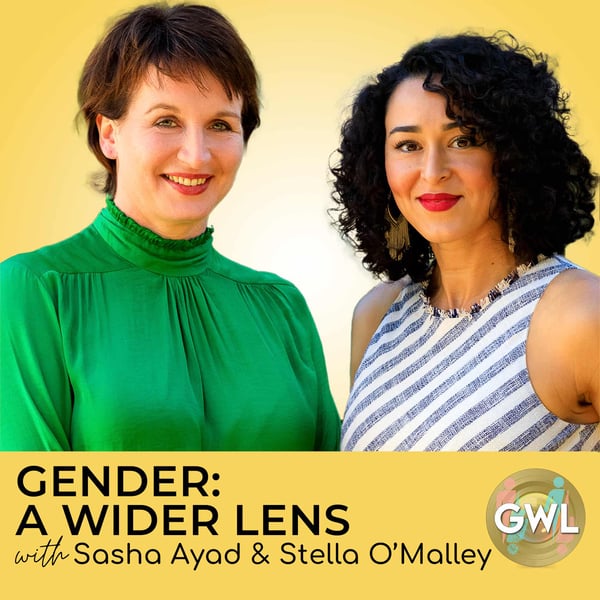12 - Identity vs Role Confusion in Adolescence
Gender: A Wider Lens
Sasha Ayad and Stella O'Malley
4.6 • 961 Ratings
🗓️ 26 February 2021
⏱️ 63 minutes
🧾️ Download transcript
Summary
The psychologist Erik Erickson’s theory of psychosocial development makes some essential observations about the period of adolescence and identifies the questions at this phase of life as “Who Am I?” and “What can I Be?”. Sasha and Stella examine this developmental period and ask how the concept of gender identity lays atop the teenage struggle for belonging, individuation, sexual development, and autonomy.
Links:
- The Adolescent Psyche: Jungian and Winnicottian Perspectives, by Richard Frankel
- Untangled: Guiding Teenage Girls Through the Seven Transitions into Adulthood, by Lisa Damour, Ph.D.
- Hold on to Your Kids: Guiding Teenage Girls Through the Seven Transitions into Adulthood, by Gordon Neufeld & Gabor Maté
- “Trans Activism’s Dangerous Myth of Parental Rejection,” by Lisa Marchiano
- Childhood and Society, by Erik H. Erikson
Extended Notes
- The process of growing up; although it looks different across cultures, we all have to go through it.
- Stella shares the coming of age ceremonies she did for her children.
- There are 8 stages of “growing up” that we do, according to Erik Erikson:
- Infancy
- Toddler
- Early childhood
- Middle childhood
- Adolescence
- 20s–30s — Seeking intimacy
- 40s–60s — Stagnation
- 60s+ — Your legacy
- It’s so important for children to do things with a sense of conviction.
- Why are the adolescent years so turbulent?
- Erik Erikson was the person who coined the phrase, “Identity crisis.”
- Up until 12 years old, everything a parent says is considered “law.” After 12, they turn it off and take in outside influences. This makes sense. Children need this process.
- Children reject everything you stand for because they don’t want to be a clone of you.
- As a mother, Stella says there is nothing that strikes terror in our hearts more when our children are unhappy.
- Once our children are teenagers, is there nothing we can do to help them through this process?
- Parents need to have a working knowledge of what their teenagers are swimming in. This is a vital time to build a stronger relationship with the child, not disconnect from them.
- Do you want to understand where your children are coming from? Make the effort to learn what they’re into.
- Teenagers are agonizing over what to call themselves. It’s difficult. There are a lot of categories to choose from.
- As our sexuality develops, there is some shame around our feelings.
- When it comes to becoming transgender, children are not good at making judgments about long-term things.
- Teenagers sometimes can get wrapped up in the fantasy of blaming someone else for their developmental confusion.
- No one has perfect parents. There is a common thread on online forums that parents reject trans children, so it sets the child up to be defensive when they...
This is a public episode. If you’d like to discuss this with other subscribers or get access to bonus episodes, visit www.widerlenspod.com/subscribe
Transcript
Click on a timestamp to play from that location
| 0:00.0 | You're listening to gender, a wider lens. |
| 0:04.0 | I'm Stella O'Malley, a psychotherapist in Ireland. |
| 0:06.5 | And I'm Sasha Ayad, an adolescent therapist in the United States. |
| 0:10.6 | Since 2016, my practice has been exclusively dedicated to gender questioning teens |
| 0:16.1 | and families impacted by gender dysphoria. I also work with gender questioning |
| 0:20.7 | teenagers and I facilitated support meetings for families and |
| 0:24.2 | individuals who have been impacted by gender issues. We're curious about the |
| 0:28.1 | concept of gender and how it's unfolding in the wider culture. Join us as we look at gender through a wider lens. |
| 0:35.0 | Hi, Sata. |
| 0:38.0 | Hi Stella, how are you? |
| 0:40.0 | Good, good. |
| 0:41.0 | Looking forward to this episode. |
| 0:43.0 | So we're talking about development today. |
| 0:45.0 | So of course there are different stages of development |
| 0:48.0 | and I'm interested in the adolescent piece, |
| 0:51.0 | but what are we going to use as our framework for this |
| 0:54.4 | conversation? Well Eric Ericsson is really interesting a psychologist really from |
| 1:00.0 | from Germany and he developed a lot of Freud's theories around psychosocial |
| 1:06.0 | development and Freud as many of us might know was very centered upon our |
| 1:10.6 | sexual development and Ericsson think, gave it more nuance by saying actually the |
| 1:17.3 | psychosocial development that happens to children and to adults and to people in late adulthood he goes all the way through |
| 1:24.8 | our lives and he wrote a book in the 1950s called Childhood and Society and then he |
... |
Please login to see the full transcript.
Disclaimer: The podcast and artwork embedded on this page are from Sasha Ayad and Stella O'Malley, and are the property of its owner and not affiliated with or endorsed by Tapesearch.
Generated transcripts are the property of Sasha Ayad and Stella O'Malley and are distributed freely under the Fair Use doctrine. Transcripts generated by Tapesearch are not guaranteed to be accurate.
Copyright © Tapesearch 2025.

